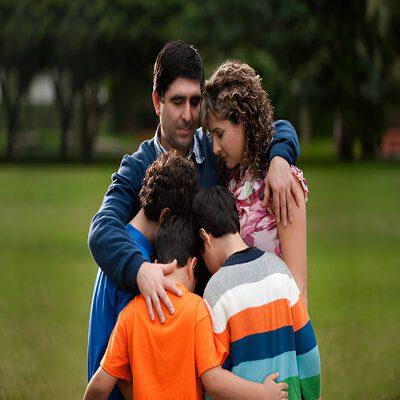The Unseen Toll of Loss
After losing his mother, Daniel expected sadness—but what surprised him was how grief invaded every aspect of his being. He felt exhausted, struggled to focus, and found his emotions swinging between sorrow, guilt, and fleeting relief. Grief wasn’t just an emotion—it was a full-body experience.
Daniel’s story is common. Grief can affect both mind and body in overwhelming, unpredictable ways. Recognizing these symptoms helps us practice self-awareness, seek support, and move toward healing.
“I thought I’d just be sad, but I never expected the fatigue, the brain fog, and the racing heart. Understanding that these physical signs were normal really helped me cope.”
When Grief Touches Every Part of Us

Anxiety and Fear
😟 Grief often sparks uncertainty about the future, making the world feel unstable.
🔹 Increased fear of further loss or sudden tragedy.
🔹 Worry over finances, family stability, or personal safety.
🔹 Feeling perpetually on edge or awaiting the next hardship.
Loneliness and Isolation
🚪 Grief can create a sense of disconnection, as if no one truly understands.
🔹 Avoiding social situations.
🔹 Feeling pressured to “move on” prematurely.
🔹 Experiencing loneliness, even in company.
The Emotional Symptoms of Grief
Grief is far more than sadness—it’s a complex emotional storm, shifting rapidly and taking many unexpected forms.
Sadness and Despair
💔 A deep sense of emptiness, longing, or sorrow is one of the most familiar aspects of grief.
🔹 Crying frequently or unexpectedly.
🔹 Feeling a void that nothing seems to fill.
🔹 Losing interest in previously enjoyable activities.
Anger and Irritability
🔥 Many individuals experience frustration and anger, directed at themselves, fate, or even medical professionals.
🔹 Asking “Why did this happen?” or “Who is to blame?”
🔹 Feeling resentful toward others who seem unaffected.
🔹 Easily irritated by small inconveniences.
Guilt and Regret
⏳ People may replay past moments, wondering if different choices might have changed the outcome.
🔹 “I should have been there more.”
🔹 “Did I do enough?”
🔹 “I feel relieved they’re not suffering, but I feel guilty for that relief.”
Mental Fog and Difficulty Concentrating
🧠 Commonly called “grief brain,” this phenomenon makes everyday tasks seem overwhelming.
🔹 Forgetfulness and trouble focusing.
🔹 Struggling to stay engaged in conversations or work.
🔹 Feeling detached from reality or daily routines.
The Physical Symptoms of Grief
Grief also resides in the body, manifesting in tangible ways that can be as challenging as emotional pain.
1. Fatigue and Exhaustion
😴 Despite sleep, many grieving individuals feel persistently drained.
🔹 Feeling physically weak or sluggish.
🔹 Needing more rest than usual.
🔹 Struggling to start the day or maintain energy.
2. Changes in Appetite
🍽️ Grief disrupts eating habits, often swinging between two extremes.
🔹 Loss of appetite—food seems unappealing.
🔹 Overeating for comfort—turning to sweets, carbs, or “comfort foods.”
🔹 Stomach pain or nausea related to emotional distress.
3. Sleep Disturbances
🌙 Grief can upend natural sleep cycles, causing both insomnia and oversleeping.
🔹 Lying awake, replaying memories or fears.
🔹 Seeking excessive sleep as an escape.
🔹 Experiencing nightmares or waking up emotionally drained.
4. Aches, Pains, and Tension
⚡ Grief often appears as physical pain, even when no illness is present.
🔹 Frequent headaches or migraines.
🔹 Muscle tension in the shoulders, neck, or back.
🔹 Joint pain or a general sense of body discomfort.
5. Weakened Immune System
🦠 Chronic stress from grief can lower the body’s defenses.
🔹 Increased colds, infections, or flare-ups of existing conditions.
🔹 Slower recovery from minor illnesses.
🔹 Heightened inflammation or autoimmune responses.
6. Shortness of Breath and Tightness in the Chest
💨 Emotional stress can mimic anxiety attacks, making breathing difficult.
🔹 Feeling a weight on the chest.
🔹 Experiencing sudden breathlessness or dizziness.
🔹 Having panic-like symptoms during intense waves of grief.
7. “Broken Heart Syndrome”
💔 In severe cases, grief triggers Takotsubo cardiomyopathy (or Broken Heart Syndrome), where extreme stress weakens the heart muscle, mimicking heart attack symptoms.
Why Recognizing These Symptoms Matters
Coping Strategies for Managing Grief Symptoms
1. Talk About Your Feelings
💬 Expressing grief eases emotional and physical burdens.
- Share with trusted friends, family, or a grief counselor.
- Join a grief support group—knowing others share similar pain can be comforting.
- Journal to process complex thoughts privately.
2. Engage in Gentle Physical Activity
🏃 Movement relieves stress and supports overall health.
- Walks in nature can clear the mind.
- Yoga or stretching addresses muscle tension.
- Consider low-impact routines like swimming or tai chi.
3. Prioritize Self-Care
🛀 Consistent self-care habits anchor you in times of emotional upheaval.
- Aim for regular sleep patterns—allow for napping if needed.
- Incorporate balanced meals to strengthen immunity.
- Practice deep breathing exercises or meditation to calm the nervous system.
4. Seek Professional Help When Needed
🎗️ Therapy can be a crucial support if grief escalates or persists.
- Grief counselors provide targeted coping strategies.
- Cognitive Behavioral Therapy or medication may help if depression sets in.
- If physical symptoms worsen, consult a healthcare provider.
5. Honor Your Loved One in Meaningful Ways
🕯️ Rituals help reconcile love and loss.
- Create a memory book or photo album.
- Continue or adapt traditions they cherished.
- Volunteer or donate to causes your loved one supported.
When individuals ignore or dismiss grief’s effects, emotional and physical struggles may linger:
✔️ Unaddressed grief can develop into more complex mental health challenges.
✔️ Awareness of symptoms helps validate the experience, prompting self-care and external support.
✔️ Seeking help is a proactive step toward emotional well-being, not a sign of weakness.
“In grief, the body and soul mourn together, whispering the love that once brightened every day.” — Mara S.
Things To Try This Week!
Talk It Out:
- Pick one trusted person—friend, family, or counselor—and share one detail of your grief journey. Speaking it aloud can alleviate isolation.
Gentle Movement: - Dedicate ten minutes each morning to easy stretching or a calm walk. Allow your body to release tension accumulated in sorrow.
Create a Comfort Kit:
- Gather items that soothe you (candles, soothing music, comforting snacks, a soft blanket). Use it when grief’s physical toll feels overwhelming.
Conclusion
Grief Affects the Whole Self
Grief extends beyond the heart, embedding itself in the mind and body. Recognizing these emotional and physical symptoms allows individuals to realize that what they feel is normal and deserving of empathy and care.
✔️ There is no single correct way to grieve.
✔️ Healing requires time and active self-compassion.
✔️ Seeking support—whether through friends, therapy, or holistic wellness—is a courageous step forward.
Ultimately, grief speaks to the depth of love shared. By attending to your emotional and physical needs, you honor that love while gradually forging a path toward renewed balance. 💙
Recognizing that grief reverberates through every layer of your being—thoughts, emotions, and physical health—is vital for meaningful healing.
As you navigate this profound journey, remember that self-kindness and external support both matter. Explore our cherish collections below for heartfelt resources, gentle practices, and supportive ideas to guide you in honoring your loss while nurturing your whole self.
More Reflections, More Growth
Beyond Tears: Nurturing Mind and Body Through Grief’s Challenges
Grief can weigh on every aspect of your life, from aching muscles to restless nights. Our All Things Cherish collection offers insights, community support, and mindful strategies that acknowledge your sorrow’s full impact. Let each practice become a step toward renewed strength, recognizing love in every ache and every sigh.
Loss is complex, and the road to healing is different for everyone. These reflections offer insight, support, and guidance as you navigate this journey.
They Never Got to Grow Up—But They Changed Everything
They never got to grow up, but their presence changed everything. This post reflects the profound grief of losing a child too soon, and the emotional weight of their absence, knowing that the impact they made in their short time here will never be forgotten.
You Carried Them Into the World—Now You Carry the Day They Left
You carried them into the world, but now you carry the weight of the day they left. This post delves into the raw grief of losing a child, the emotional devastation of having to live through a loss no parent should ever endure, and the heartbreaking reality of that final goodbye.
You Still Set Their Place at the Table
You still set their place at the table, even though they’re no longer there. This post reflects the deep grief of losing a child, where every family tradition feels incomplete, and the emotional struggle of continuing a routine that no longer feels whole without them.
You Kept Their Laugh—Now It’s What Hurts Most
Their laugh was everything—now, it’s the thing that hurts the most. This post reflects the raw grief of losing a child, where the memory of their laugh haunts and heals, and the pain of losing them becomes intertwined with the sounds of joy that once filled your life.
They Always Made It Home—Until They Didn’t
They always made it home, but now they’re gone. This post reflects the deep grief of losing a grandparent, someone who was always there, and the emotional shift that comes with the realization that they will never walk through that door again.
They Told the Same Stories—Now There’s No One Left to Tell Them
They told the same stories, and now there’s no one left to tell them. This post reflects the deep grief of losing a grandparent, and the sorrow of realizing that the stories and memories they shared are gone with them, leaving a space that can never be filled.
You Held It Together—Until You Didn’t
You held it together for so long, but now it’s falling apart. This post reflects the deep, overwhelming grief of losing a sibling, and the moment when the weight of that loss becomes too much to bear. It’s the painful journey of navigating life without the sibling you relied on.
They Always Led the Way—Now You Walk Alone
They always led the way, but now you walk alone. This post reflects the deep grief of losing a sibling who was your guide, your mentor, and your partner in life’s journey. It’s the painful reality of facing the world without the one who always showed you the way.
You Hated Each Other—But They Were Still Yours
You hated each other, but they were still yours. This post reflects the deep and complex grief of losing a sibling, even when your relationship wasn’t perfect, and the emotional pain of realizing that despite the struggles, they were still an irreplaceable part of your life.
Explore Journeys of Healing and Solace:
Discover dedicated spaces that offer understanding, guidance, and connection through grief. From the loss of loved ones to life’s challenging transitions, each category provides a pathway to reflect, connect, and find peace in shared experiences.


























